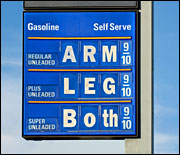
Referring to high oil prices, the billionaire airline magnate Richard Branson recently declared, "Thank God it’s happened … A high oil price is what we needed to actually wake up the world" to the reality of climate change. (This from a man who openly pines for a techno fix that will allow us to burn through all the fossil fuel we want, and enjoy our climate, too.)
David and others have made the point before, but it bears repeating: High oil prices do not by any stretch translate to lower carbon emissions. In fact, as an excellent essay by Drake Bennett in today’s Boston Globe shows, just the opposite is happening.
Here’s the nut:
[A]s oil prices stay high, the real beneficiary often turns out to be a very different alternative-energy industry, one focused on dirty fuel sources such as oil sands, oil shale, and coal. Environmentally speaking, the oil-sand plants of Alberta are no better than petroleum drilling, and in some ways decidedly worse. In North America, in terms of energy output, this so-called "unconventional oil" sector already dwarfs clean and renewable-energy technologies, and is poised to grow even faster in the next decade. "To assume that high energy prices mean we’ll switch to wind or solar or other renewables is simply unrealistic," says Amy Myers Jaffe, an energy expert at the James A. Baker III Institute for Public Policy at Rice University. "It only means that if we make that a concerted policy."
I only wish Bennett had devoted space to debunking another fantasy of Branson’s: the idea that biofuels represent some sort of climate-change panacea.
